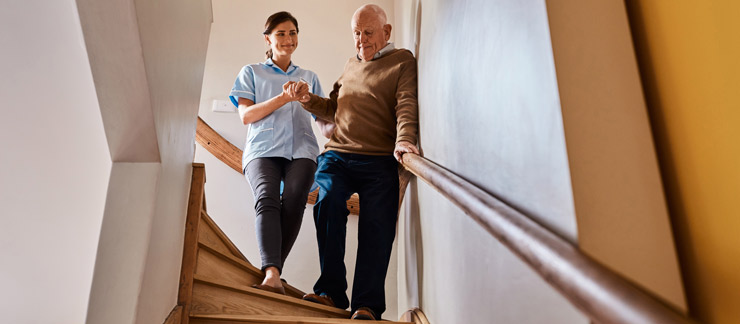
Creating a Safer Home for Seniors with Parkinson's Disease
As a neurodegenerative brain disorder, Parkinson ’s disease (PD) affects an individual’s body movements, which in turn increases falling risks, especially for the elderly. Home safety becomes even more paramount for seniors living with Parkinson’s to ensure they age in place as long as possible without experiencing a debilitating injury.
If you need to create easier navigation and a safer home environment for seniors with PD, you need to remove obstacles in every room that increase falls risks. Here are some home safety tips from The Michael J. Fox Foundation for Parkinson's Research and the Parkinson's Foundation.
General Living Area Safety
- Remove throw rugs as well as extension, phone and computer cords. Individuals with PD tend to shuffle their feet and may get tangled in them
- Secure carpets. A softer surface can give your loved one more traction to get around the house
- Secure furniture to ensure its stability
- Make sure chairs have arm rests and adequate seat height to ease standing
- Consider investing in an adjustable reclining chair that helps with standing
- Rearrange furniture to widen openings and create a clear path around the home
- Install night lights throughout the home with timers
- Use touch lights or those that respond to sound
- Install railings along stairs, walls and hallways
- Check that smoke alarms and carbon dioxide detectors work in all rooms
Bathroom Safety for the Elderly
- Add grab bars for shower safety for the elderly
- Add non-skip strips to shower floor
- Add a shower chair or bench with back support
- Add seating at sink to perform daily grooming tasks
- Remove throw rugs
- Change a conventional toilet for an elevated version
Bedroom Safety
- Remove clutter to make it a more relaxing space
- Raise bed height so feet touch floor when seated at side of bed
- Install a side rail or use a bed pole that helps with rising from the bed
- Place a phone and flashlight on night stand
- Add bright nightlights
- Place a commode bedside for nighttime use
Kitchen Safety
- Rearrange shelves to make commonly-used foods easily accessible
- Replace cabinet knobs with handles that are easier to close and open
- Place spices, pots and pans and other items frequently used for cooking by the stove
- Add rubber-handled utensils that are easier to grip
Understanding Parkinson’s Motor Symptoms
Parkinson’s presents limitations for individuals, and those caring for someone with PD needs to understand the symptoms. As a movement disorder, it can affect an individual’s mobility in many ways, including:- Slowed body movements
- Resting tremors in arms, hands, face, and jaws
- Limb rigidity
- Balance problems
- Muscle stiffness
- Freezing gait
- Stooped posture
- Slowed or slurred speech
Emotionally, many clients suffer from depression, fear, anger, sadness, loneliness, isolation, and feelings of helplessness. Find out more about the symptoms by reading Parkinson's Disease: What You Need to Know.
Stages of Parkinson’s Disease
PD can start slow with almost unnoticeable symptoms and progressively get worse. According to the Parkinson's Foundation, the disease progresses in five stages.
- Stage 1: Individuals experience mild symptoms that are bothersome but don’t interfere with daily life.
- Stage 2: Walking and posture problems become more apparent, with persons experiencing tremors and rigidity of the body. While tasks take longer, persons with PD can still live alone.
- Stage 3: Increased loss of balance and slower movements can result in falls. While living independently, the person may need help to perform activities such as eating and dressing.
- Stage 4: Symptoms are severe, limiting walking and standing without assistance. Unable to live alone, the person requires home care with activities of daily living.
- Stage 5: In this advanced stage, muscle stiffness makes it impossible to stand or walk. As a result, a senior with PD requires a wheelchair or is bedridden. Hallucinations and illusions may begin. Round the clock care is needed for all activities.
As a progressive disease, no timeline exists when certain symptoms occur. Typically, the severity depends on how long a person has PD. Preparing the home for these different stages can prevent an accident in the future.
Getting the Right Home Care for Parkinson’s
At some point, your senior suffering with Parkinson’s disease may need daily assistance or even round-the-clock care. Activities that were once a pleasure may now pose a danger. While you want to do what you can to support your senior loved one, you may have difficulties being there as much as you would like. Nor, do you have the specialized knowledge in caring for someone with PD.
Consider professional home care services. Visiting Angels home care specialists can help with activities of daily living, ambulation, meal preparation, eating, and medication reminders. Trained in providing home care for Parkinson’s, our staff ensure your loved one follows home safety recommendations and gets the support that maintains their quality of life.
Initially, we assess the home and make recommendations in making the home safer and easier to navigate for your senior. We also provide suggestions to you and your family in living with Parkinson’s. Ongoing assessments ensure additional home adjustments to support aging seniors as PD symptoms advance. With our home care, you are assured a professional caregiver will get to know your loved one and his/her needs in every stage of PD.


